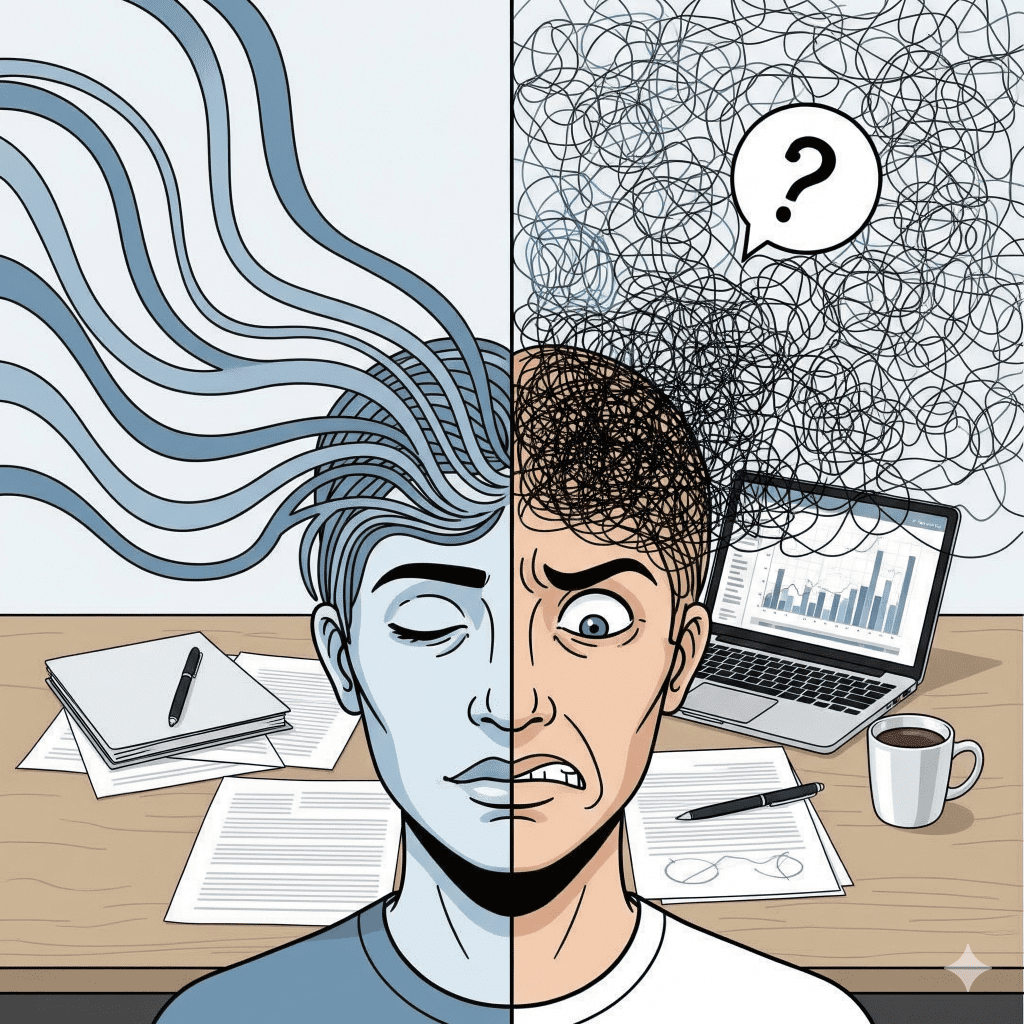Best Jobs for People with Bipolar Disorder: Careers, Challenges, and Success Strategies
The last two weeks have been a bit hectic, as I’ve taken on the director role of a major non-profit organisation. I feel proud that I am able to take on such a role; however, I would not have taken such a position in previous years. Jobs for people with bipolar disorder can be a challenge for many years. In fact, many people with bipolar disorder claim disability aid due to the severity of their illness. I want to begin by saying that jobs for bipolar people are not unattainable. Just check out our previous post related to 5 successful bipolar businessmen
For more, check out my book The Five Pillars of Bipolar Recovery, book and masterclass. You can also check out my free resources.
3 Essential Keys to Succeed in Jobs for Bipolar People: Routine, Flexibility, and Low-Stress
During the acute phases of bipolar disorder, I found it quite challenging to be at my best at work. I wasn’t surprised to learn that 40–60% of people diagnosed with bipolar disorder are unemployed. That statistic hit me hard, because it made me worry whether jobs for bipolar people were even possible. I started to feel like I might never achieve success in my career, which then led to very dark feelings and a sense of worthlessness. Believe me—I know exactly how heavy that can feel.

At the same time, I realized that I wasn’t alone in my struggle in keeping a job. I learned to be merciful with myself as my body was healing. I was able to tell myself that it was a big deal to hold any job while dealing with the extremes of depression and mania. I learned to forgive myself daily for not being able to do even the most basic tasks.
So what did I do? I started looking up ideal jobs for people with bipolar disorder. The three features that helped me were flexibility in schedule, low-stress, and routine work. Here is what I wrote down:
Examples of Ideal Jobs for Someone with Bipolar Disorder
- Creative Professions: there is this idea that because of the intensity of emotions, people with bipolar disorder can translate their emotions through creative professions. Think of painters, illustrators, writers, editors, voice actors, musicians, graphic designers, video editors, architects, interior designers, animators, photographers. Just be sure to take breaks away from screens and to avoid them at night.
- Flexible and Remote Roles: Because you never know which day might be heavy in the morning and which day hard in the evening, having flexibility in work hours is key. Consider “project based” jobs like freelance writer, web designer, software developer, virtual assistant, remote customer service, social media manager, bookkeeper.
- Low-Stress Jobs: I know what you are thinking… every job has some stress! However, some are by default quiet in nature and pretty easy going. It goes without saying that when someone is struggling to maintain a stable mood, a high-stress job will make things even more challenging. Consider becoming a librarian, archivist, research assistant, tutor, clothes tailor, massage therapist, yoga instructor, dog walker, personal trainer.
- Routine-Friendly Positions: Okay, so this one is a bit counter to the “flexibility” part mentioned above, but here me out. When you are past the chaotic ups and downs of bipolar, it is part of conventional advice to have a routine — especially when you are in the depressive side of bipolar. Consider roles like accountant, banker (teller or planner), proofreader, researcher, receptionist.
- Outdoor or Independent Work: When there is all this pent-up anxiety, working outdoors or independently while moving your body is a great way to regular your mood. I always say that by moving the body we quiet the mind. Consider roles like landscaper, cleaner, delivery driver, factory worker that isn’t too noisy.
- Health and Wellness Careers: Similarly, I came into this space of wellness because I had the lived experience of getting out of a severe mental illness. You could become a physical therapist, personal trainer, yoga or Pilates instructor.
Are there high-paying job Titles for Bipolar People?
At the beginning of your journey, I advise clients to evaluate the role of healing and recovery in relation to pursuing their career dreams. When I first received my diagnosis, I was at the top of my game. I was crushing it in my graduate studies at an Ivy League university when I started to show grave signs of mania. When the doctors put me on medication, I was unable to pursue my studies further.
And man was it tough letting go of that dream. I had to learn to be okay with it, and I advise you to do the same. I decided to focus on my recovery for two years with a low-stress job before jumping back into the corporate world and starting my own business.

So what are some high paying career paths for someone with bipolar disorder?
- Web Developer / Software Engineer: These roles pay well, often offer remote and flexible work, and focus on project-based tasks that can be managed within regular daytime hours.
- Financial Analyst / Accountant: These professions provide good salaries and benefit from predictable routines and structured environments. Investment banking may be too high-stress, but financial advisement, accounting, or tax planning can be suitable with the right setting.
- Architect / Designer: Creative roles such as architect, graphic designer, or animator can pay very well, especially in freelance or agency positions where project work and creative expression are prioritized.
- Writer / Editor: Established writers, copy editors, and technical writers can earn substantial incomes, particularly as consultants or in publishing, and enjoy flexible schedules.
- Healthcare Professional (specialized): Some paths such as physical therapy or occupational therapy offer high salaries and regular, daytime hours, making them a potentially good fit for some people.
- Business Owner / Consultant: Entrepreneurship in a passion area—like creative services, consulting, or boutique retail—allows maximum control over environment, schedule, and workload. But be careful in the early stages as there can be a lot of chaos; Trust me, I speak from experience!
What did I do?
I became a farmer! I had always wanted to become part of the local, seasonal agriculture scene because of the ecology books I read in college. Working outside helped me relieve anxious energy, feel great in the fresh air and son, and exhausted my body for bedtime. It worked very well!
Careers for People With Bipolar Disorder: Frequently Asked Questions
Should you tell your Employer?
This is a personal choice. There are disabilities laws in place that prevent discrimination just because you have the diagnosis. If you are able to demonstrate ability to do your job well, you should not have to worry about being judged for handling your condition. However, if your case is still severe, it is important to have an open conversation with your employer about your health so that they can work with you.
They ultimately have a business to run, so it is about finding a job that the right fit for where you are in your healing journey. And if you feel like you can handle yourself without telling your employer, you’re not obligated to tell so long as it does not interfere with your work. Unfortunately, there is still stigma around mental illness and some people feel nervous that bipolar is a reason for not being promoted or one’s opinions valued.
Because of this blog, I really can’t hide the fact that I have struggled with mental illness. But this sort of opennes has allowed me great networking opportunities. I’ve learned that people find inspiration in talking about mental health in the workplace. Just like there are people at jobs who can openly talk about diabetes, heart disease, and obesity, I want to normalize talking about chronic mental illness like bipolar disorder in the workplace.
Worst Jobs for Bipolar: Careers to Be Careful With
Any job that is the opposite of routine, flexible, and low-stress is going to create challenges.
- Jobs with Overnight or Rotating Shifts: THIS is the WORST kind of job you can get with bipolar disorder. Sleep is the most important pillar of my Five Pillars of Bipolar Recovery program.
- Emergency Services (ER Nurse, Paramedic, Firefighter): These jobs are highly stressful with unpredictable hours, critical decisions, and fast-paced environments that can trigger mood swings and anxiety. Plus, you are liable for caring for other people’s lives.
- Teaching: Particularly in-person teaching can be emotionally and physically demanding with high stress, large responsibilities, and classroom management challenges that may lead to burnout and emotional exhaustion. With the way school funding is going these days, teachers get way more students than they can handle, they are buried and grading and paperwork, and the pay just doesn’t work in this economy.
- Food Service (Chef, Waiter, Hostess): These jobs often involve fast-paced work, irregular hours, multitasking, and repeated interactions with the public, which can be overwhelming. The public is harsh when a waiter does not provide excellent service, so you might want to avoid that kind of pressure.
- Legal Practitioner: High demands, tight schedules, intense mental work, and confrontational situations in court can be difficult for someone with bipolar disorder to manage. In general, attorneys rank among the unhappiest professions, so they are particularly challenging for working with bipolar.
- Medical Practitioners (Nurses, Surgeons, Pediatricians): Long shifts, high responsibility, need for composure under pressure, and unpredictable work schedules make medical fields challenging. Also, with the amount of paperwork there is, burnout is REAL. Moreover, the liabilities and inefficiencies in the administration can be very stress inducing.
Best Jobs for Bipolar Females?
We are fortunate to live in a world where women have made many strides to be treated as equals in the workplace. Similarly, there have been many advances this century to protect people living with chronic mental illness from discrimination.
My answer to these questions is twofold: (1) bipolar females should consider the same rule of seeking jobs that are routine, flexible, and low-stress; (2) jobs that women naturally fall into, for the most part, are also ideal for women with bipolar disorder. This does not, however, mean that women with bipolar disorder can’t go into fields that are dominated by men.
How Does Being Bipolar Affect Your Job?
The effects of bipolar on job performance are manifold:
- Concentration and Focus: During depressive phases, people typically struggle with focus, motivation, memory, and decision-making, leading to decreased productivity and difficulty completing tasks.
- Energy Levels: Manic or hypomanic episodes may cause bursts of energy and creativity, but can also result in impulsiveness, poor judgment, and risky behavior at work.
- Attendance & Punctuality: Mood episodes may cause absences or tardiness due to health challenges or the need for treatment. Priorities and sleep schedule get out of whack and, before you know it you’ve missed a couple of meetings or shifts and your boss will notice.
- Stress Management: High-stress jobs or unpredictable environments can exacerbate symptoms, increasing the risk of mood episodes.
- Interpersonal Relationships: Bipolar disorder can affect communication and social skills, creating challenges in coworker or supervisor relationships. Especially, if you haven’t disclosed to the people at your office,
- Sleep Disruption: Irregular sleep common in bipolar disorder disrupts cognitive function and emotional regulation, impacting workplace performance. The way I got around this is (1) having a strict sleep schedule, (2) taking magnesium supplement, and (3) taking reishi mushroom.
Is It Hard for Bipolar People to Keep a Job?
Unfortunately, the data reflects an undeniable YES to this question. With 40-60% of people diagnosed with bipolar disorder unemployed, the challenges of this chronic illness highlighted above do make it challenging to keep a job. But, open communication with your employer and a good routine like the Five Pillars of Bipolar Recovery make it VERY possible to not just keep your job but exel in your career.
How to Keep a Job with Bipolar Disorder (Tips & Strategies)
- Understand Your Triggers: One of the best advices I got early on is that, “while there are general characteristics for bipolar, everyone’s experience is different. Know your triggers, cycles, and coping mechanisms the BEST.” You must know yourself and what takes you to a bad mental space in order to avoid them in the workplace.
- Consistent Treatment: Stick to your prescribed medications and therapy. Regular mental health care helps stabilize mood and improve concentration and energy. Add naturaly strategies like supplements, yoga, healthy eating, and good sleep hygiene.
- Create a Routine: Develop a structured daily schedule including consistent sleep, meals, breaks, and exercise to regulate mood swings. But also be merciful with yourself if the day doesn’t go as planned.
- Communicate Selectively: Decide whether and how much to disclose about your bipolar diagnosis at work. Share only with trusted supervisors or HR if accommodations are needed.
- Set Boundaries: Learn to say no, avoid overcommitment, and prioritize your mental health needs. It’s okay to tell your colleagues and boss that you can’t do certain things out of a sense of protecting your health. If someone with heart disease or diabetes can do it, why can’t someone with bipolar disorder?
- Plan for Difficult Days: Have a backup plan, like a trusted coworker or remote work options, for days when symptoms make working difficult.
- Organizational Tools: Use planners, reminders, and apps to keep track of tasks and deadlines.
- Build a Support Network: Find support from coworkers, friends, family, or peer groups to reduce isolation and gain encouragement.
- Self-Care: Prioritize healthy eating, sleep, exercise, and engaging activities outside of work.
- Professional Help: Consider vocational rehabilitation or counseling focused on managing mental health in the workplace.
What is the Best Job for a Bipolar Person: Final Remarks
Jobs for someone with bipolar disorder can be challenging. However, I like to think of my career in terms of “when” I’ll be successful not “if” any longer. Be graceful with yourself if you cannot achieve the type of job that you had hoped for. Trust your body’s ability to heal itself over time. You can and will get better… it just may take longer than you like.
After two years of low-stress, routine farming work, I dipped back into a low stress corporate job. Then I jumped into entreprenuership. And finally, today, I started a director role for a major non-profit organization. I share this not to toot my own horn but to give you or your loved hope that career success is achievale while living with bipolar disorder.


